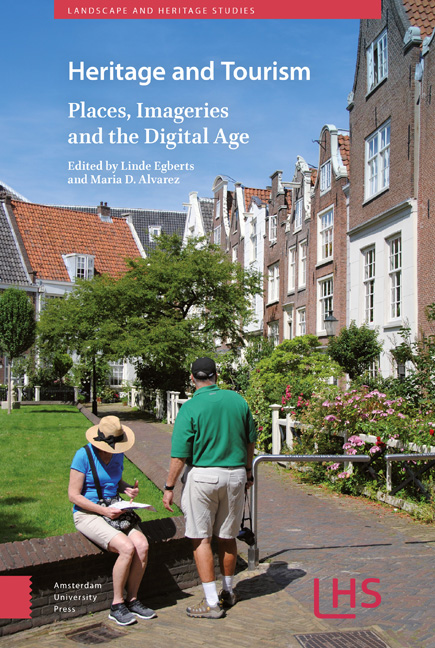Book contents
- Frontmatter
- Dedication
- Contents
- List of Figures and Tables
- Foreword
- 1 Tourism and Heritage: Crafting Experiences Through Innovation
- 2 Tourism Conflicts and Conflict Tourism: Curating “Holoscapes” in Europe’s Age of Crisis
- 3 Heritage Landscapes of Hiroshima and Nagasaki
- 4 Revealing and Presenting the Past(s) for the Public: Fethiye Mosque and Museum as a Cultural Heritage Site in Istanbul
- 5 Who Takes the Lead in Initiating Cooperation in a Cultural Network and Why?: The case study of a Rural Finnish Destination
- 6 Sustainability of Heritage-Tourism Destinations: A Demand-Based Perspective on Cusco, Peru
- 7 Localising National Tourism Websites: The case of World Heritage sites
- 8 Enhancing the Tourist Heritage Experience through “In-Situ”, Customisable, 3D-Printed Souvenirs
- 9 Tracking the Heritage Tourist: Heritage tourism and Visiting Patterns in a Historic City
- 10 The Construction of a Tourist-Historic Icon: The case of the Palace of Westminster, London
- 11 Conclusion
- Index
6 - Sustainability of Heritage-Tourism Destinations: A Demand-Based Perspective on Cusco, Peru
Published online by Cambridge University Press: 22 December 2020
- Frontmatter
- Dedication
- Contents
- List of Figures and Tables
- Foreword
- 1 Tourism and Heritage: Crafting Experiences Through Innovation
- 2 Tourism Conflicts and Conflict Tourism: Curating “Holoscapes” in Europe’s Age of Crisis
- 3 Heritage Landscapes of Hiroshima and Nagasaki
- 4 Revealing and Presenting the Past(s) for the Public: Fethiye Mosque and Museum as a Cultural Heritage Site in Istanbul
- 5 Who Takes the Lead in Initiating Cooperation in a Cultural Network and Why?: The case study of a Rural Finnish Destination
- 6 Sustainability of Heritage-Tourism Destinations: A Demand-Based Perspective on Cusco, Peru
- 7 Localising National Tourism Websites: The case of World Heritage sites
- 8 Enhancing the Tourist Heritage Experience through “In-Situ”, Customisable, 3D-Printed Souvenirs
- 9 Tracking the Heritage Tourist: Heritage tourism and Visiting Patterns in a Historic City
- 10 The Construction of a Tourist-Historic Icon: The case of the Palace of Westminster, London
- 11 Conclusion
- Index
Summary
Abstract
Sustainability is a key issue for cultural tourism destinations, which needs to be communicated and marketed to the tourists. Thus, a better understanding of how tourists perceive sustainability attributes in tourism destinations is paramount to support these sustainability initiatives. This study analyses the comments from tourists on Cusco, Peru, posted on the TripAdvisor website during the period of one year. The aim is to understand which sustainability attributes in cultural tourism destinations are most mentioned in these evaluations, and therefore may be considered as most visible and important for tourists. This information is essential in order to provide guidance to cultural destinations wishing to better market their sustainability efforts to their current and potential customers. The research determines that tourists mostly mention aspects pertaining to the protection of the cultural values and unique identity of the destination. These aspects are also those that contribute to create a better experience for the tourists.
Keywords: sustainability, cultural tourism destination, demand-based perspective, tourism experience, Cusco
Introduction
Heritage and tourism are often described in the literature as being interdependent, one supporting the other (Fonseca & Ramos, 2012). Many tourists are motivated to travel to a particular place in order to learn about its history and customs (Fonseca & Ramos, 2012), and thus culture and heritage become important assets that increase the attractiveness of the destination. In return, tourism may support the preservation of the heritage by providing a needed source of capital (Russo & van der Borg, 2002), generating funds that may be used to preserve not only sites, but also intangible values (Salazar & Zhu, 2015). However, while tourism may have a positive impact on destinations, it may also lead to negative results such as commodification of culture and values, gentrification of the sites, and physical damage to their resources from over-visitation (Kaminski, Benson, & Arnold, 2014). In many cases, heritage-led economic development may even result in visitors displacing the inhabitants from their neighbourhoods, putting the fragile ecosystems of historic city centres under threat and thereby negatively impacting the residents’ quality of life.
Thanks to growing awareness and concern about these potential negative impacts of tourism, the idea of sustainability as a sine qua non for tourism development has emerged.
- Type
- Chapter
- Information
- Heritage and TourismPlaces, Imageries and the Digital Age, pp. 115 - 130Publisher: Amsterdam University PressPrint publication year: 2018



